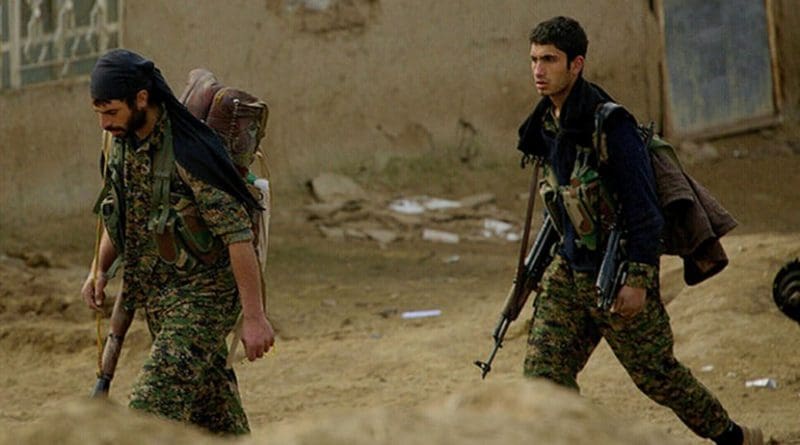US Cutting Off Arms Supply To Kurds Fighting In Syria
By Arab News
By Menekse Tokyay
US President Donald Trump on Friday informed his Turkish counterpart Recep Tayyip Erdogan of “pending adjustments” to military support for Syrian-Kurdish forces, the White House said.
Turkish Foreign Minister Mevlut Cavusoglu, who was in the same room as Erdogan during the phone call, said Trump instructed US generals and his National Security Adviser H.R. McMaster that “no weapons would be issued.”
But in a more reserved statement, the White House said Trump informed Erdogan “of pending adjustments to the military support provided to our partners on the ground in Syria, now that the battle of Raqqa is complete and we are progressing into a stabilization phase to ensure that ISIS (Daesh) cannot return.”
Washington began arming the Syrian-Kurdish People’s Protection Units (YPG) to liberate Raqqa from Daesh. But Turkey considers weapons supplies to the YPG a national threat.
Some analysts see the new announcement as a gesture by Washington to mend ties with Ankara, which have suffered due to disagreements over Syria. But some analysts are cautious about the significance of the decision.
Ankara deems the YPG a terrorist organization affiliated to the outlawed Kurdistan Workers’ Party (PKK), which has waged a three-decade-long insurgency against the Turkish state.
But the Pentagon views the YPG as an effective partner on the ground in Syria, arming it through an umbrella group known as the Syrian Democratic Forces (SDF), which is composed of Kurdish and Arab fighters.
Ankara fears that weapons supplied to the YPG will end up in PKK hands in Turkey. Both Ankara and Washington consider the PKK a terrorist organization, but the US draws a distinction between the two Kurdish groups.
Ahmet K. Han, a Middle East expert from Istanbul Kadir Has University, said the US has already delivered a considerable amount of material to the YPG, and what is important at this point is whether Washington can retrieve what is left, as was previously promised to Turkey.
“A key issue for Turkey now is if these weapons and ammunition could find their way from the hands of the YPG, a PKK surrogate, to the PKK proper,” Han told Arab News. “One question is whether Trump can deliver on his word.”
Han added: “The next phase of the conflicts in Syria and Iraq is still uncertain, and ambiguity remains on how US decision-makers will react.”
He said regional developments could lead the US to act in ways that may be detrimental to Turkish interests, as has happened before.
“Turkey can’t be expected to be comforted just by Trump’s words before the dust settles and the US fulfills its promises,” Han added.
“We also don’t know how the other parties to the Syrian conflict, such as Russia, will react to emerging circumstances, and if and how they’ll try to leverage their relations with the YPG and PKK.”
Mete Sohtaoglu, an Istanbul-based researcher on the Middle East, said the US will stop supporting all groups on the ground in Syria with whom it had been cooperating against Daesh.
“From Washington’s perspective, the YPG is nothing more than a group it cooperated with on the ground, and with the end of the fight against Daesh, this cooperation will also be over… so there’s no need for further supplies,” Sohtaoglu told Arab News.
“Any supplies in the future will be for the needs of about 2,000 US troops who are based in Syria,” he said.
“The end of American supplies will determine with whom the YPG engages in the future. Except for US support, the YPG has no distinct superiority over other groups on the ground.”
Meanwhile, the UN Special Envoy for Syria said he will be inviting the Syrian opposition delegation to Geneva for the intra-Syrian talks beginning next week as his deputy held talks with Syrian officials in Damascus over this month’s negotiations.
Staffan de Mistura’s statement came a day after the opposition named its unified delegation that includes internal and external groups to the Geneva talks which will start Tuesday. The 36-member delegation will be headed by Nasr Hariri, a cardiologist who took part in previous talks in Geneva over the past year.

